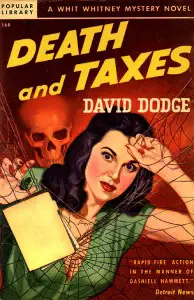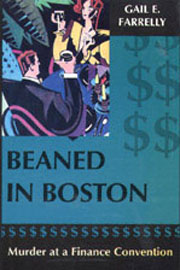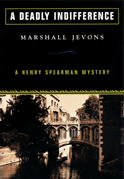I can’t think of a subject less likely to be thrilling than accounting. I don’t understand accounting, I don’t understand people who like accounting, and I don’t see how accounting can be a good subject for crime novels. Well, they can and do. Being math challenged is probably why the idea of number crunching appalls me. Plus, there is the added pain of needing to take book-keeping courses to become competent and employable. My brother in-law is an accountant at a major drugstore chain here in the US, and he appears to love it. He spends half his life doing it, and it gives him a nice home for the wife and three kids, so it’s probably a much better course of action then like, say, acting. So, if I accept the idea of accounting as being a vital interesting subject, then I will try to combine it with murder, and see what it gets me.
Apparently, there are some writers who favor this profession and have utilized it within their mysteries. One from the past was David Dodge–he wrote a few novels with an accountant as detective. Death and Taxes has always intrigued me because of the title and art work on the Popular Library cover. I suppose I should have guessed with a title like that it referred to something with numbers, but I plum didn’t think about it–and now, I’m not sure I want to read it! After finding some info on Dodge, I may change my mind. From a site about the author:
“His career as a writer began when he made a bet with his wife Elva that he could write a better mystery novel than the one she was reading. He drew on his professional experience as a Certified Public Accountant to create his first series character, San Francisco tax expert and reluctant detective James “Whit” Whitney. Death and Taxes was published by Macmillan in 1941. He won five dollars from Elva. Three more Whitney novels were published between 1943 and 1946.”
Surprise surprise, he’s also responsible for To Catch a Thief–the book Hitchcock’s famous film is based.
So, one writer embraced the numbers racket–let’s see who else has. Another great surprise awaits–Dick Francis, known for his experience with horse racing, also had an accountant/amateur jockey as his protagonist in a book. Risk featured Roland Britten. Britten’s accounting career has brought down a number of embezzlers and that may be why he’s been kidnapped. Here’s a possibility–many believe that Mary, Francis’ wife wrote much of the series–he provided the background of horse racing, she provided the actual writing. The Francis family tepidly denied this claim, and then clammed up–but if she did write the actual stories, it would be more likely she’d give the protagonists other professions, besides one of jockey.
Gail Farrelly writes accounting mysteries. She may be self published or may not, it depends on whether she was published before Chicago Spectrum Press was bought by Evanston Publishing Inc. Although Spectrum was a pioneer of electronic books, they didn’t accept manuscript submissions, which may keep them from being a self pubber. Evanston Publishing, which now holds Spectrum’s backlist claim they help people self pub, but ‘are not a vanity’ press. If you aren’t picky about this issue here’s what Farrelly says about mysteries and accounting:
“As different as they seem, accounting and mystery writing actually have a lot in common: Both deal with details. Both are structured. Both require intricate and involved thinking. And, on a personal level, both have been an important and fulfilling part of my life.”
Beaned in Boston is about murder at a finance convention. Moving on–Emma Lathen was a well respected and read mystery author whose themes were generally finance oriented. Accounting for Murder‘s title speaks for itself- “a mystery involving miscalculations and murder at the National Calculating Company, where an accountant is found strangled with his adding machine cord.”
The last entry into this narrow theme is Marshall Jevons–and here’s what the website says about ‘him’
“Marshall Jevons is the pseudonym for the team of William Breit, Professor Emeritus at Trinity University, and Kenneth G. Elzinga, Robert C. Taylor Professor of Economics at the University of Virginia. The two friends and colleagues teamed up for their first murder mystery in 1978, Murder at the Margin, after Mr. Breit mentioned his idea of writing a detective novel with an economist-sleuth to his close friend Mr. Elzinga. According to Breit, the team “plunged right in,” and the rest, as they say, is history. Murder at the Margin was followed by two more installments in the series,The Fatal Equilibrium (1985) and A Deadly Indifference(1995). Henry Spearman, the protagonist of all three novels, is a Harvard economist who uses economic theory to solve crimes. Both entertaining and educational, Marshall Jevons’ mysteries are regularly used as teaching tools in college-level economics courses.
The pen name Marshall Jevons is derived from two nineteenth century economists, Alfred Marshall and William Stanley Jevons. The first mystery, Murder at the Margin, was published without referencing the true identity of its writers. Instead, a fictional biography was created for the author: Marshall Jevons is the President of UtilMax, Inc., an international consulting firm headquartered in New York City. A former Rhodes Scholar, he holds advanced degrees in economics, biochemistry, and oceanography. Mr. Jevons is an Olympic medal holder in kayaking whose hobbies now include rocketry and the futures market in cocoa beans. He is a native of Virginia but prefers to call ‘home’ the Queen Elizabeth 2. This is Marshall Jevons’ first novel.”
As interesting as these books all sound, uh, I think I’ll keep to detectives and sleuths who have no need to count, except for the bullet wounds they’ve received!
Further Reading:





There’s also new(ish) author Diane Kelly, who’s heroine is an IRS accountant who carries a gun. Her latest is Death, Taxes, and a Skinny No-Whip Latte.